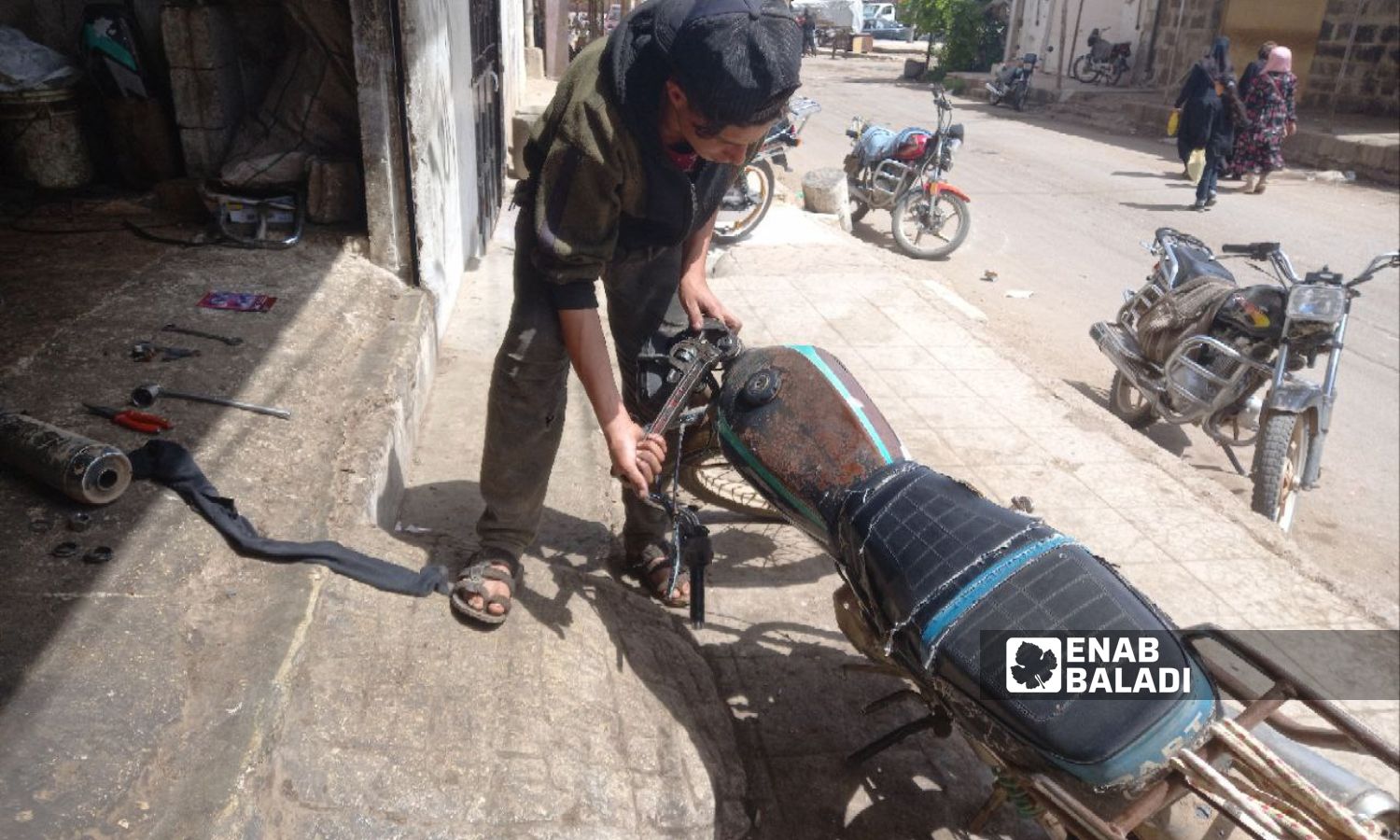



Daraa – Halim Muhammad
Basel no longer carries his school bag every morning, heading to his school as any child his age should. Instead, he now wears a blue suit, preparing to go to the car repair shop where he works in the city of Tafas, west of Daraa.
Basel abandoned his studies under the pressure of the family’s economic conditions and headed to the labor market at the age of only 13.
The southern province of Daraa is witnessing a growing number of school dropouts who work in industrial professions due to the economic conditions of their families, the failure of the educational process, the spread of unemployment, and the depreciation of salaries in public jobs in Syria.
Alaa, Basel’s father, told Enab Baladi that he forced his son to leave school so that he could learn the mechanic profession in the coming years, as studying is no longer feasible in the current circumstances.
He added that within the next five years, his son will master the profession and be able to open his own workshop.
Alaa believes that learning a profession is better than academic achievement, especially when the salary of an employee does not exceed 200,000 Syrian pounds, at a time when many university graduates are working as day laborers.
The minimum wage in areas under the control of the Syrian regime is 185,000 Syrian pounds (around 12 dollars).
Basel told Enab Baladi that he wanted to continue his studies, but his father’s preference was for him to gain experience in his profession, which he ultimately favored, even though he began to feel physical fatigue from the first days of starting work.
Mohammed Barakat, 15, also left school after his family failed to cover his daily expenses, as he needed around 4,000 pounds for transportation to the distant school from his place of residence.
Mohammed joined agricultural day labor work some time ago, earning a daily wage of up to 25,000 Syrian pounds.
One of the reasons that led Mohammed to leave his studies is that he is fatherless and lives with his 70-year-old grandmother.
Mohammed’s grandmother told Enab Baladi that she had hoped that her grandchild would complete his studies and enter university, but she was unable to cover his daily expenses, which prompted her to encourage him to work to help in covering the household expenses.
Social researcher Talal Mustafa told Enab Baladi that the early exit of children to work is a social problem suffered by many societies.
He added that the child labor specificity of Syrians is linked to the events witnessed by Syria during the past years, whether as a result of forced displacement or the state of poverty that the Syrian people live in.
Naturally, according to Mustafa, the natural place for a child should be his school, away from the chaos of the labor market.
The researcher added that the reality of Syrian children today is “tragic,” as many of them have had their childhood violated and are being exploited in many different fields of work.
The researcher believes that children are paying the price for the harsh economic conditions that families have been through in recent years and the decrease in Syrians’ income rates.
Burhan al-Salim, 45, who lives in the western countryside of Daraa, told Enab Baladi that he pushed his three children to learn vocational skills away from school, protesting the poor state of education in Daraa governorate.
He added that there are no teaching experiences or educational monitoring in Daraa, so he pushed his children to learn a profession, believing that there is no benefit in teaching them in light of this educational reality.
Ammar, one of al-Salim’s sons, 14, told Enab Baladi that he had not completed the fourth grade and joined the mechanic work with the support of his father, who believed that his son would have never become a “professor” anyway.
Wael, another child aged 15, left school after failing in the seventh preparatory grade and went far away to pave his way in the markets of Daraa, according to what his father told Enab Baladi, who attributed his son’s failure in school to the poor teaching staff and the failure of the educational process.
Social researcher Talal Mustafa believes that one of the most important reasons that lead a child to leave school and join the labor market is the perception among the child’s family of the failure of the educational process.
The lack of opportunities for learners with academic certificates makes the child unwilling to study, so that his/her future would not be similar to his/her family’s predecessor, Mustafa added.
The United Nations Children’s Fund (UNICEF) published a report in January 2021 stating that more than 2.4 million children are out of school, with 40% of them being girls.
The report mentioned that one out of every three schools in Syria was damaged.
The report also added that children who are able to attend school study in overcrowded classrooms amidst a lack of clean water, health facilities, lighting, heating, and proper ventilation in schools.
if you think the article contain wrong information or you have additional details Send Correction